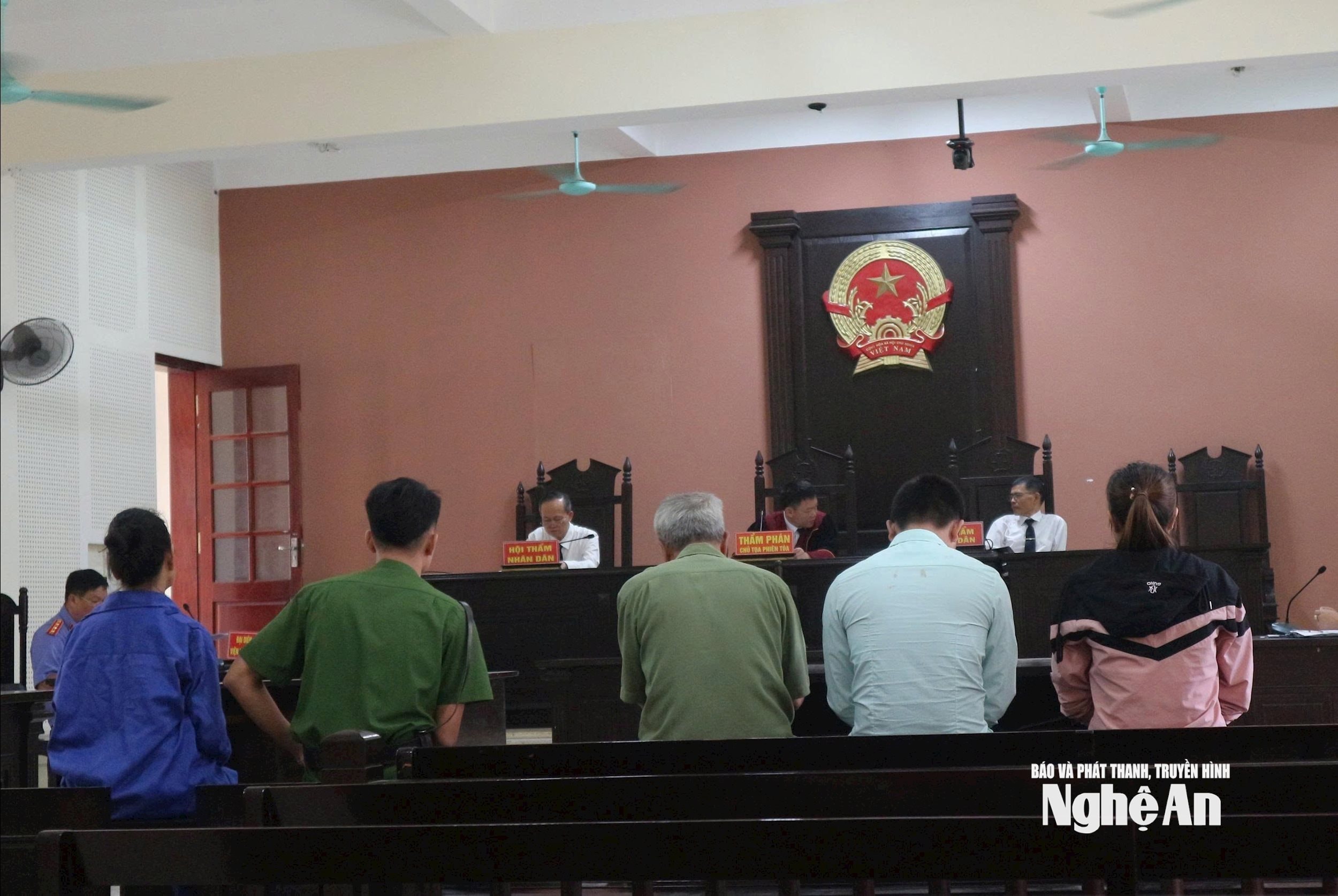The late regret of a wife who 'accidentally' murdered her husband
“My child, I accidentally did it!” – the cry of Mrs. Nguyen Thi Dung (born 1967), resident of Chau Loc commune, Nghe An province, pierced the night as she hugged her husband who had just collapsed after two stab wounds from her hand. Although she was rushed to the emergency room, it was too late. From a peaceful family, tragedy struck in an instant, turning the gentle woman into a defendant, her two children suddenly orphaned, and her mother caught up in the law.
Tragedy from a drunken night and anger beyond the threshold
As soon as she entered the courtroom and saw her relatives and children, Mrs. Nguyen Thi Dung burst into tears. Perhaps this wife is still haunted by what she did. Just because she was angry about her husband drinking late at night and losing control of his behavior towards her, she took the life of her husband who had been her mother for many years. The father died, the mother was in trouble with the law, leaving the children orphaned.

On the afternoon of June 22, 2024, Mr. SVQ (born in 1964) went to repair the lawn mower as usual. Late at night, still not seeing her husband return, Mrs. Nguyen Thi Dung (born in 1967) anxiously called many times to urge him to come home for dinner. Mr. Q. said he had not finished his work yet and told his wife to eat first. After finishing his meal alone, she was still restless. She made a few more calls, but it was almost 11 p.m. when she heard the sound of a motorbike in front of the gate.
Mr. Q. came home drunk, and as soon as he entered the house, he asked his wife to turn on the lights because “I was drunk”. When she went out into the yard, he suddenly blamed her: “You don’t care about your husband coming home late!”. They argued, annoyed that her husband was still drunk and still blaming her, she replied: “Why are you still eating and drinking? When I called you, you didn’t come home”.
Unable to control himself, he swung his arm and kicked Mrs. Dung, causing her to fall face down on the well floor. The fall caused her excruciating pain, and the fatigue from her long-term joint pain made her mentally agitated. Standing up, she saw a knife nearby and picked it up, both to protect herself and to “threaten” her husband to stop.
But Mr. Q. kept coming, continued to wave his arms and kick, but missed. During the struggle, he suddenly hugged her from behind. In a state of panic, pain, and pent-up anger, she turned around and stabbed her husband twice in the chest.
Mr. Q. collapsed. She dropped the knife, hugged her husband and shouted: “Son, take me to the hospital!”. The two children heard the noise and ran out to see their mother holding their father covered in blood. Panic, despair, crying, and apologies mixed together in the dark night.
Despite being rushed to the emergency room that night, Mr. Q. died from wounds to his heart and lungs. The incident shocked the whole neighborhood. People said that Mrs. Dung had been gentle and hardworking for many years and had never raised her voice at anyone. No one believed that his wife could cause such a tragedy.
Since her indictment, she has been living in torment. Every time her son came to visit, she could only bow her head and cry. “If only I had held on a little longer that day…”, she said many times in tears.

The trial and the lingering verdict of conscience
Her husband died, Nguyen Thi Dung was arrested for murder. Neighbors were stunned, thinking it was impossible because this woman was usually gentle, hard-working, and always took care of her family. After nearly 30 years of marriage, they had two children, one boy and one girl. However, when they became grandparents, tragedy struck the family again.
On the day of the trial, as soon as she saw her children and grandchildren, Mrs. Dung burst into tears. The small, haggard woman tried to stand firm at the witness stand, but her trembling hands could not hide her remorse.
She told the jury that she had no intention of taking her husband’s life. For many years, every time he got drunk, she tried to be patient to keep the peace at home. On the day of the incident, she was kicked in the sore spot and held by him in a moment of agitation, so she reacted instinctively. “The defendant only wanted to scare him to stop… but did not think it would cause such consequences,” she said, bursting into tears.
When asked: "Why didn't you run away?", she choked up: "At that time, my leg hurt so much. Besides, he hugged me from behind, I was so scared, I couldn't think in time."
The defense attorney said that for many years, whenever Mr. Q. was drunk, he had beaten his wife. The defendant had accepted this to maintain family harmony, fearing that it would affect the children. That night, being kicked in a painful joint caused her to lose control. The attorney did not dispute the charges, but asked the court to consider the circumstances and the nature of the conflict that had accumulated over many years.
In the legal representative seat of the victim, the two children cried many times when listening to their mother's presentation. Both asked the court to reduce the sentence for their mother and did not request compensation. "We have lost our father, now we just hope that our mother will return soon so that we can have emotional support," the son said.

When given the last word, Mrs. Dung bowed her head: “I apologize to my husband’s family and my two children. I am very remorseful. I hope the court will give me a chance to return soon to take care of my elderly mother and make it up to my children.”
The panel of judges determined that the defendant's actions constituted the crime of murder under Clause 1, Article 123 of the Penal Code, with particularly serious consequences. However, the defendant had many mitigating circumstances: Sincerity, repentance, good character, had partially remedied the consequences, and the victim's representative asked for a reduced sentence.
The court analyzed: “When the husband is drunk, the defendant should be patient and avoid arguing so that the conflict does not escalate. Just one minute of anger can lead to tragedy for the whole family.”
After deliberation, the panel sentenced the defendant to 8 years in prison.
At the end of the trial, Mrs. Dung walked out amidst the silent gazes of her children, grandchildren, and relatives. No one blamed her anymore, only sorrow remained. A moment of loss of control had swept away the home that had been built for nearly 30 years, leaving behind an irreplaceable void.
The legal sentence will one day be carried out, but the sentence of conscience that this woman must carry with her will probably haunt her for the rest of her life. Her family tragedy is also a warning: Family conflicts, especially when one party is drunk, only need one overreaction to turn anger into crime.


